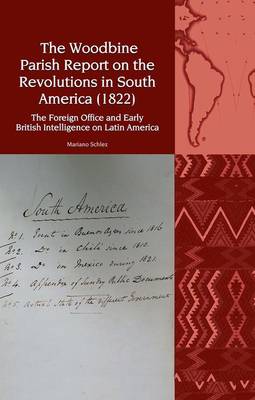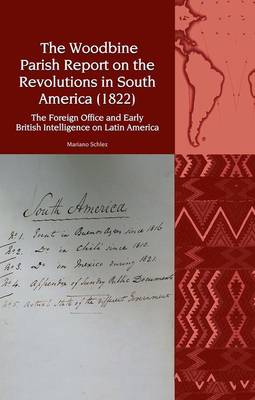
- Retrait gratuit dans votre magasin Club
- 7.000.000 titres dans notre catalogue
- Payer en toute sécurité
- Toujours un magasin près de chez vous
- Retrait gratuit dans votre magasin Club
- 7.000.0000 titres dans notre catalogue
- Payer en toute sécurité
- Toujours un magasin près de chez vous
The Woodbine Parish Report on the Revolutions in South America (1822)
The Foreign Office and Early British Intelligence on Latin America
Mariano Martín Schlez
220,45 €
+ 440 points
Description
This book presents the unpublished intelligence report "South America", written in 1822 by Woodbine Parish, clerk at the Foreign Office, Castlereagh's private secretary and later the first British Consul to Buenos Aires. The document is transcribed, analysed and fully contextualised in order to foreground its decisive historical significance. The aim of Parish's report was to outline British foreign policy and political strategy towards the South American revolutions at the final Congress of the Holy Alliance, held in Verona. Its publication contributes to the ongoing debates on Informal Empire, providing new empirical evidence that will enable us to better understand the social content of the political, economic and cultural relationships established between Britain and Latin America in the first half of the 19th century. The history of the document and of its author introduce the reader to the early stages of British intelligence and diplomacy with respect to an Independent Latin America, revealing the Foreign Office's powers and limitations. Likewise, they offer an overview of the information about the South American revolutions circulating in London at the time, as well as the mechanisms used by the British government to obtain, classify and publicize this intelligence for political purposes. In this sense, the report makes evident the importance for the British government of knowing a specific historical and geographical reality in order to develop a foreign policy and political strategy. The book reflects on how this knowledge was mediated by class antagonisms and social relations (on a national and international scale) and was shaped by the stages of development of the productive forces in the regions involved. In this sense, studying the Parish family will allow us to more fully understand the role played by the increasingly influential social classes, in particular the merchants and manufacturers, in the development and implementation of a British foreign policy for Latin America.
Spécifications
Parties prenantes
- Auteur(s) :
- Editeur:
Contenu
- Nombre de pages :
- 296
- Langue:
- Anglais
- Collection :
- Tome:
- n° 27
Caractéristiques
- EAN:
- 9781802077315
- Date de parution :
- 01-01-23
- Format:
- Livre relié
- Format numérique:
- Genaaid
- Dimensions :
- 156 mm x 234 mm
- Poids :
- 589 g

Les avis
Nous publions uniquement les avis qui respectent les conditions requises. Consultez nos conditions pour les avis.






